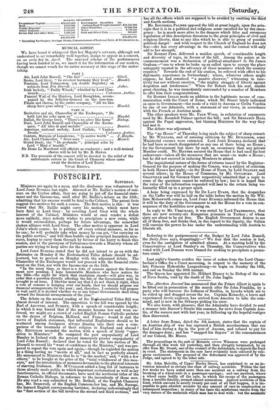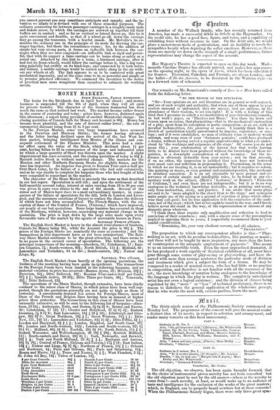Mr. John Melville, of Upper Harley Street, has explained to
us an in- vention intended to obviate one class of railway accidents. Within the last few weeks we have noted more than one accident on a railway from the breaking of a wheel-axle in a passenger-carriage ; and one accident, where a wheel came bodily off the axle, in which the escape of the passengers from a terrible fatality, seemed almost miraculous. Against accidents of this kind, which amount to nearly twenty per cent of all that happen, it is im- possible to gain absolute security by any amount of care in construction or subsequent mspection • in many of the cases the misfortune results from the very nature of the materials which man has to deal with: but the aecidents- you cannot prevent you may sometimes anticipate and remedy, and the in- vention we allude to is devised with one of these remedial purposes. The ordinary connecting tie between passenger-carriages is a roughly-made male and female screw, by which the carriages are screwed up together till their buffers are in contact : and so far as vertical or lateral forces go, this tie is quite unresistent and flexible, so that if a wheel go off, down the carriage may go among the transoms, with a fearful smash. Mr. Melville's tie re- sembles the ordinary one in the principle of its mode for drawing the car- riages together, but there the resemblance ceases ; for, by the addition of simple but very strong parts, it forms an inflexible link between the car- riages when they are once conjoined—an inflexible link so rigid and power- ful, that with its support a lame carriage can be borne along as safely as a sound one. Attached by this link to a train, a hindmost carriage, after it had lost its front-wheels, would follow the carriage before it, like a dog run- ning painfully but swiftly on its hind-legs ; and connected by it both before and behind, a middle carriage would be carried safely along in the air with- out any wheels at all. The link appears to us to be contrived with great mechanical ingenuity, and at the same time to be so powerful and simple as to promise practical efficiency. We commend the invention to the notice of practical men more competent than ourselves to estimate its working merits.



























 Previous page
Previous page